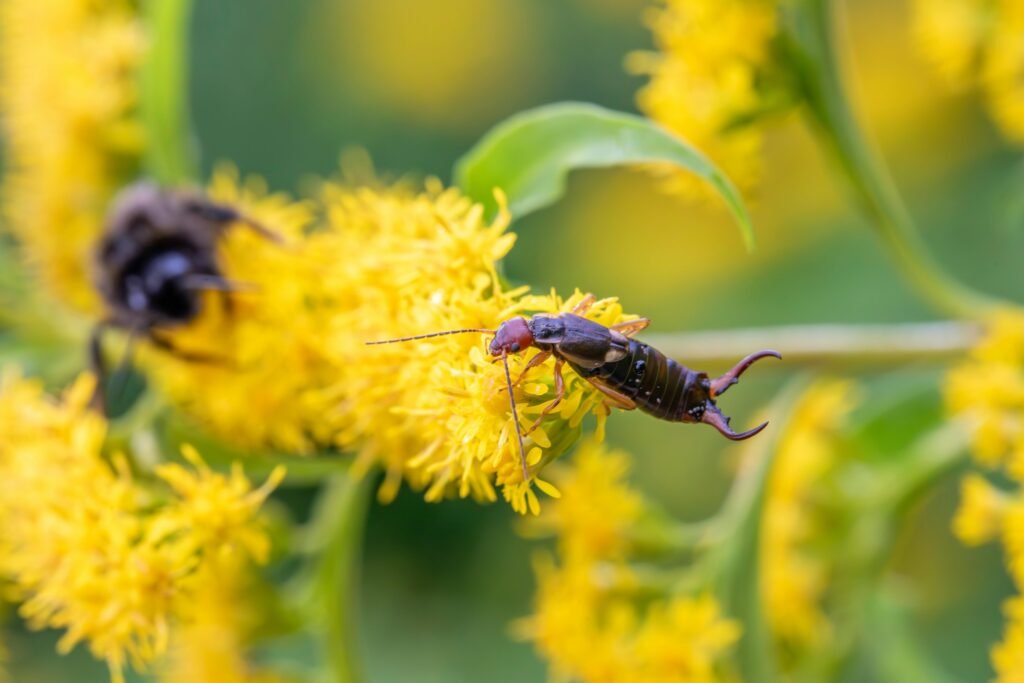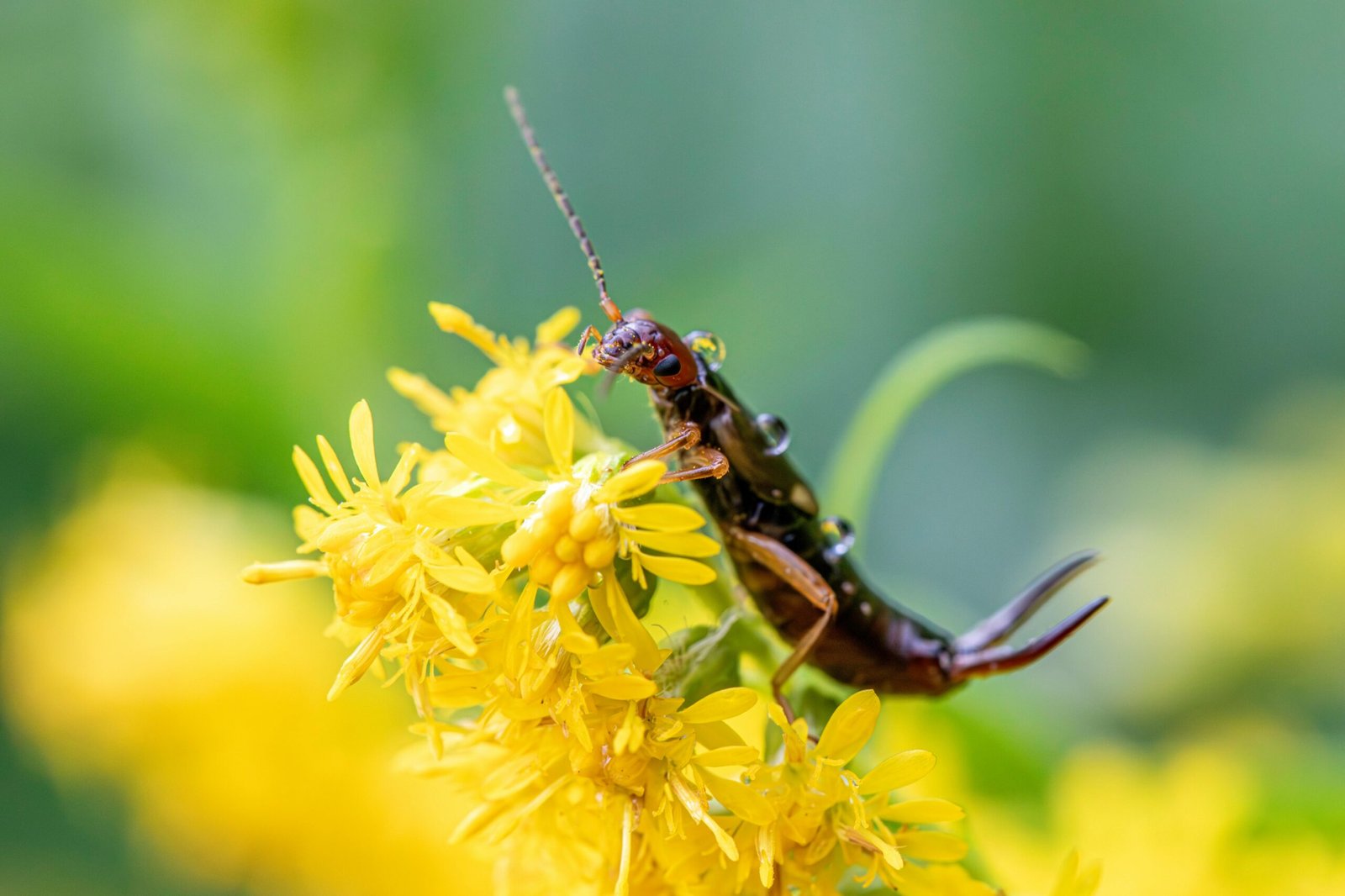Dealing with earwigs can be really frustrating. They can ruin your garden and sneak into your home. This makes you feel uneasy. But, there are natural ways how to get rid of earwigs without using harsh chemicals.
In this guide, we’ll look at many effective and safe methods. These will help you take back your space and keep earwigs away for good.
Understanding Earwigs: Facts and Habitat
Earwigs, also known as pincher bugs, are small insects that rarely grow over an inch long. They have a distinctive segmented abdomen and a pair of pincers at the rear. Unlike what many believe, earwigs do not crawl into people’s ears to lay eggs. Instead, they are omnivorous, eating decaying plant matter and other insects.
What Are Earwigs?
Earwigs belong to the order Dermaptera, with over 20 species in the United States. These nocturnal insects are about ½ to 1 inch long. They have a body type with pincers, long antennae, and a slender frame. Earwigs live on all continents except Antarctica, preferring cool, moist places.
Preferred Habitats of Earwigs
- Earwigs are attracted to light and often hide in wood piles, boxes, or newspapers.
- They may enter homes seeking warmth during the fall and winter months.
- Earwigs thrive in damp, protected areas like mulch, rocks, or logs in gardens.
- Their reproduction occurs outdoors, with female earwigs laying 20-80 eggs in the soil or small crevices.
- Earwigs are more prevalent in the southern and southwestern United States due to their preference for cool, moist locations.
Common Misconceptions About Earwigs
Despite their intimidating appearance, earwigs are not a significant threat to humans. One common myth is that they can crawl into people’s ears and lay eggs, which is not supported by scientific evidence. Additionally, the pincers on earwigs are used for defense and prey capture, but they are not dangerous to humans.
“Earwigs do not form colonies, making infestations relatively rare compared to insects like ants or bees.”
Another misconception is that earwigs may lay eggs in the human brain, which is a far-fetched notion. In reality, earwigs are beneficial insects that help control pests like aphids, reducing the need for chemical insecticides.
| Earwig Fact | Statistic |
|---|---|
| Female earwigs lay eggs | 20-80 white or cream-colored eggs |
| Earwig life cycle | Egg, nymph, and adult phases |
| Earwig diet | Insects, fungi, rotting plant matter, edible plant parts, and other small creatures |
| Earwig damage | Chewing on delicate shoots, leaves, and blossoms in crops |
| Natural predators of earwigs | Birds and frogs |

Signs of an Earwig Infestation
Earwigs can be a nuisance, but spotting their signs is key to getting rid of them. These insects prefer moist, dark places and leave clues of their presence. Knowing these signs helps you act fast to stop an infestation.
Physical Signs in Your Home
Seeing earwigs is a clear sign. They are small, reddish-brown, and often found in damp spots like bathrooms or kitchens. They also leave behind their old skins and egg casings, showing they’re around.
Behaviors to Look Out For
- Earwigs are drawn to light, so they might gather near outdoor lights or windows.
- They hide in dark, moist spots like under appliances or behind baseboards.
- They can damage plants or leaves as they search for food.
- Finding earwig pincers or exoskeletons is a strong sign they’re in your home.
Spotting these signs and behaviors helps you know you have an earwig problem. Then, you can use earwig repellents or earwig extermination methods to take back your space.
Preventing Earwig Infestations
To keep your home earwig-free, you need a few steps. Seal up entry points, manage moisture, and use smart landscaping. These steps help keep your home safe from earwigs.
Creating a Barrier Against Earwigs
First, check your home’s foundation, siding, and doors for cracks. Use caulk or weather-stripping to seal these spots. Focus on utility pipes, windows, and doors, as earwigs often enter here.
Managing Moisture Around Your Home
Earwigs love damp places. So, it’s important to control moisture. Fix leaks and ensure good drainage. Clean gutters and ventilate humid areas to keep your home dry.
Landscaping Strategies
Outdoor landscaping can also help. Plant catnip, tansy, and yarrow to repel earwigs. Keep your garden clean and remove fallen leaves to discourage them.
| Earwig Prevention Tips | Safe Earwig Removal |
|---|---|
|
|
Follow these tips to keep earwigs away. A good plan and action can keep your home pest-free. Stay proactive to enjoy a safe home.
Natural Remedies to Deter Earwigs
Dealing with earwigs doesn’t mean you need harsh chemicals. There are many natural ways to keep them away. These methods are safe for your family and the planet.
Using Essential Oils
Peppermint, lavender, and citrus essential oils can help. Mix a few drops of your favorite oil with water in a spray bottle. Spray the areas where earwigs are a problem. Their strong smells can keep earwigs away.
Diatomaceous Earth: An Effective Solution
Diatomaceous earth is a powder made from ancient algae. It can dry out and kill earwigs. Sprinkle it in places where earwigs are seen, like under sinks and in gardens. The powder’s sharp edges will dehydrate the insects.
Homemade Traps for Earwigs
Make your own traps to catch earwigs. Mix soy sauce or oil with water in a shallow container. Place it where earwigs are common. They’ll be drawn to the mixture and get trapped.
Crushing garlic cloves and soaking them in water overnight is another trick. Then, use the solution in a spray bottle for your garden. These homemade traps can help manage earwig problems without harsh chemicals.
Chemical-Free Trapping Techniques
Getting rid of earwigs doesn’t have to mean using harsh chemicals. There are many effective, chemical-free ways to trap these pests. You can use these methods in your home and garden.
Sticky Traps: How They Work
Sticky traps are a favorite for catching earwigs. They have a sticky surface that traps the insects. Place these traps in areas where earwigs are seen, like baseboards or corners.
Earwigs will be attracted to the traps and get stuck. This stops them from entering your home.
Utilizing Beer Traps
- Beer traps are another chemical-free way to control earwigs.
- Bury shallow containers filled with beer near affected plants or areas where you’ve spotted earwigs.
- The earwigs will be drawn to the beer, fall into the trap, and drown.
- Regularly check and replace these traps to maintain their effectiveness.
Light traps using a soap and water solution with a fixed light can also attract and drown earwigs. These traps lure earwigs towards the light, where they get trapped in the soapy water.
Using these chemical-free trapping methods can help get rid of earwigs. Just remember to keep an eye on and replace these traps often. This will help you keep your home and garden earwig-free.
How to Safely Remove Earwigs from Your Home
Dealing with earwigs can be a hassle, but there are safe ways to get rid of them. By following a few simple steps, you can remove earwigs safely. This won’t harm you or your home.
Vacuuming and Cleaning Tips
Regular vacuuming in areas with earwigs is a good start. This includes furniture and small spaces. Make sure to throw away the vacuum bag or empty it into soapy water. This kills any earwigs caught.
Relocating Earwigs Safely
For a gentler method, use damp newspaper or cardboard to trap earwigs. Place these traps in infested areas overnight. In the morning, carefully move them to a safe outdoor spot, away from your home.
When to Call a Professional
If earwigs keep coming back, it’s time to call a pest control service. They have the skills and tools for earwig extermination methods. They offer safe earwig removal solutions that fit your needs.
Monitoring and Maintenance After Removal
Getting rid of earwigs is just the start. Keeping your home pest-free requires ongoing checks and adjustments. These steps are key for earwig prevention and earwig control.
Regular Home Inspections
Do detailed checks of your home, especially where moisture builds up and earwigs might get in. Look closely at damp places like basements, crawl spaces, and near plumbing. These spots are where earwigs like to be.
Environmental Adjustments
- Manage Moisture Levels: Fix any leaks or extra moisture in your home right away. Use a dehumidifier in humid areas to make it less welcoming for earwigs.
- Maintain a Clean and Clutter-Free Environment: Keep your home, especially basements, garages, and outdoor spots, clean of debris and dead leaves. These attract earwigs.
- Ensure Proper Drainage: Regularly clean your gutters and downspouts. Make sure water flows away from your home’s base to avoid moist spots that earwigs like.
Regular home checks and making the right environmental changes can help prevent and control earwig infestations. This way, you can keep your living space pest-free.
Seasonal Considerations for Earwig Control
Earwig infestations can be a recurring challenge, as these pests are sensitive to seasonal changes. Understanding how weather patterns impact earwig activity is key to maintaining an effective prevention and control strategy throughout the year.
How Weather Affects Earwig Activity
Earwigs are most active during the warmer, more humid months. As temperatures rise in the spring and summer, earwig populations tend to flourish. They seek out moist environments and lush vegetation to thrive.
Cooler weather in fall and winter can drive earwigs to seek shelter indoors. This increases the risk of household infestations.
Earwig activity typically peaks in late spring and early summer when females lay their eggs. The newly hatched nymphs then emerge in May or June. This surge in population can be significant.
Warmer climates may even see two generations of earwigs per year. This further escalates the potential for infestations.
Preparing Your Home for High-Risk Seasons
- Seal any cracks, gaps, or entry points around your home’s exterior to prevent earwigs from gaining access.
- Reduce outdoor lighting, as it can attract earwigs and other insects to your property.
- Maintain a dry perimeter around the foundation of your home by diverting water from downspouts and gutters.
- During spring and summer, be vigilant about moisture control in your garden and regularly inspect for signs of earwig activity.
- In the colder months, focus on indoor prevention measures, such as reducing humidity levels and sealing any indoor access points.
By staying attuned to seasonal earwig activity and taking proactive steps to prepare your home, you can effectively reduce the risk of infestations. This helps maintain a pest-free environment throughout the year.
| Season | Earwig Activity | Recommended Prevention Measures |
|---|---|---|
| Spring/Summer | Peak activity, egg-laying, and nymph emergence | Seal entry points, reduce outdoor lighting, maintain dry perimeter, monitor garden for signs of infestation |
| Fall/Winter | Increased tendency to seek shelter indoors | Focus on indoor prevention, such as reducing humidity and sealing gaps |
Resources for Further Information
Looking for more help on controlling earwigs? Check out these resources. University extension services, entomology departments, and pest control groups have the latest tips. They offer detailed advice on managing earwigs effectively.
Recommended Reading on Pest Control
For in-depth info, look at the U.S. Environmental Protection Agency (EPA) and the National Pest Management Association (NPMA). Also, the University of Maine Cooperative Extension has great resources. They cover earwig biology, pest management, and safe control methods.
Useful Websites and Community Forums
Online forums and gardening groups share real experiences with earwig control. Your county or state agricultural office can also offer local advice. Always check the credibility of online sources and seek expert help for serious infestations.
FAQ
What are earwigs and why are they a problem?
Earwigs are small, slender insects with long, segmented abdomens and pincers on their rear ends. They are common pests that can become a nuisance. Earwigs are attracted to light and hide in damp areas, feeding on decaying plant matter and other insects.
How can I identify an earwig infestation in my home?
Signs of an earwig infestation include visible earwigs and damage to plants. You might also find them in damp areas like bathrooms or kitchens. They can be in cardboard boxes or newspapers brought in from outside.
What are some natural ways to prevent and get rid of earwigs?
Natural remedies include using diatomaceous earth and setting up beer traps. Rolled-up newspaper or cardboard can also help. Essential oils, garlic spray, and neem oil can repel them.
How can I make my home less attractive to earwigs?
Seal cracks and crevices in your home’s foundation and doorways. Manage moisture by fixing leaks and keeping gutters clean. In the garden, plant natural repellents like catnip and yarrow. Reduce clutter or organic debris.
When is the best time of year to focus on earwig control?
Earwig activity increases in warm, humid seasons. In fall, they seek shelter indoors. Seal entry points and reduce outdoor lighting in high-risk seasons. In spring and summer, focus on moisture control and garden inspections.
Where can I find more information on managing earwig infestations?
Check university extension services, entomology departments, and pest control associations for information. Online forums and gardening communities offer practical advice from others dealing with earwigs.
Source Links
- How to Get Rid of Earwigs in Your Home – https://bogpestcontrol.com/pest-control/bugs-insects/earwigs/how-to-get-rid-of-earwigs-in-your-home/
- 9 ways to get rid of earwigs and keep them away from your home – https://www.tomsguide.com/how-to/9-quick-ways-to-get-rid-of-earwigs
- How to Get Rid of Earwigs | Preventive Pest Control – https://preventivepestsocal.com/blog/what-is-an-earwig/
- Earwig Pest Control – A Guide to the Common “Pincher Bug” – https://www.familyhandyman.com/article/earwigs-guide/?srsltid=AfmBOoqy3KctYDlhlOOPAYWXNlJ5PImtzn7_aQFkoH1dvbz-EvJ5a08E
- 7 Signs of an Earwig Infestation You Should Never Ignore – https://fastactionpestcontrol.com/7-signs-of-an-earwig-infestation-you-should-never-ignore/
- How to Get Rid of Earwigs (or “Pincher Bugs”) – https://www.almanac.com/pest/earwigs
- How to Get Rid of Earwigs in the Home and Yard – https://www.familyhandyman.com/article/earwig-removal-and-prevention/?srsltid=AfmBOoqD2VTghuUetubuKenIH6lxPIV0eF__Gq1BED_WTBHEaVabZqhL
- Earwigs in My Bed: Effective Strategies for Banishing Unwanted Bedfellows – https://www.pestshare.com/earwigs-in-my-bed/
- How Do I Get Rid of Earwigs in My Garden? – https://www.thespruce.com/how-to-i-get-rid-of-earwigs-1402695
- Natural Remedies For Earwig Control: Safe And Eco-Friendly Solutions – EFI – https://environmentalfactor.com/natural-remedies-for-earwig-control-safe-and-eco-friendly-solutions/
- DIY Earwig Control: Natural Remedies and Homemade Solutions for Deterrence and Elimination – EcoGen Pest Control – https://ecogenpest.com/diy-earwig-control-natural-remedies-and-homemade-solutions-for-deterrence-and-elimination/
- How to get rid of earwigs – 8 easy ways to banish them from your home – https://www.homesandgardens.com/interior-design/living-rooms/how-to-get-rid-of-earwigs
- How to Get Rid of Earwig Infestation – https://www.environmentalpc.com/blog/how-to-get-rid-of-earwig-infestation
- How to Get Rid of Earwigs – Today’s Homeowner – https://todayshomeowner.com/pest-control/guides/how-to-get-rid-of-earwigs/
- How to Get Rid of Earwigs in Your House – https://joshuaspestcontrol.com/blog/how-to-get-rid-of-earwigs-in-your-house/
- How to Get Rid of Earwigs in the Home and Yard – https://www.familyhandyman.com/article/earwig-removal-and-prevention/?srsltid=AfmBOooCYVpT0C8o_Vfep9xdMD6XOdtfM48qF-ZPkC7M8VwyGwSD9zst
- How to Get Rid of Earwigs in the Home and Yard – https://www.familyhandyman.com/article/earwig-removal-and-prevention/?srsltid=AfmBOoqBZreYHSf-WVKjMho880YiKscIHqnvyZ6I_c6OSoRdnZCVt54a
- How To Identify and Get Rid Of Earwigs – https://www.epicgardening.com/earwigs/
- How to Get Rid of Earwigs – https://www.architecturaldigest.com/reviews/pest-control/how-to-get-rid-of-earwigs
- How to Identify, Remove and Prevent Earwigs | Orkin Canada – https://www.orkincanada.ca/blog/identify-remove-prevent-earwigs/
- Getting Rid of Earwigs – https://www.domyown.com/getting-rid-of-earwigs-a-235.html?srsltid=AfmBOopiUKjlNu98-ocUl1Zp6IC25oY2s7CfySWG4gkuajgoVcL1iGOi
- How to get rid of earwigs, one of the scariest bugs of lore – https://www.bangordailynews.com/2024/07/05/homestead/pests/get-rid-of-earwigs-one-of-the-scariest-bugs-joam40zk0w/
- Earwig Control: Identification, Remediation and Prevention – Today’s Homeowner – https://todayshomeowner.com/pest-control/guides/earwig/




